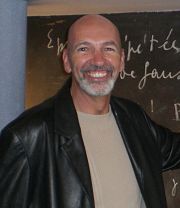Cetati Studios Vice President of Content Edward Manfre, who has been a leader in the field of mathematics education and product development for over four decades, has a passion for the company’s mission. That mission is to create digital mathematics materials that engages young learners. Cetati’s interactive Hollywood-level animated stories that teach students the sometimes arcane language of math in a natural manner and immediately reinforces it in fun ways, helps them learn to think critically and become problem-solvers.
“For years I’ve been looking for a way for students to build up their visual and language facility that they needed so that they could understand me or any math teacher. It would make classroom time so much more productive. Our products can help kids become much better learners and they lend themselves very well to teachers trying to engage their students.”
Manfre, a native New Yorker, earned a Bachelor of Science degree in physics from The Cooper Union for the Advancement of Science and Art and a Master of Science degree from Boston University. While his formal education is what launched his career as an instructor and developer of helpful materials, he learned applicable foundational math concepts in a natural way.
“When I was growing up and went shopping with my mom or my sisters, I would hear them say things like ‘this costs more or this costs less’ so I learned about the quantitative part of English, but a lot of kids don’t have that. Coming into kindergarten some understand, but some do not and the latter can feel lost because they’re not picking up on it. That can snowball and children can fall further and further behind because they’re intimidated and don’t understand. If you can start kids off on a more or less equal footing, you have more of a chance to prevent that.”
Manfre understands that sometimes math gets a bad rap. He also understands that sometimes that bad rap is deserved.
“People who say they don’t like math, really don’t like arithmetic. Guess what? I don’t either. Here’s something that I learned from one of my mentors, British mathematician Peter Hilton. He was a genius who had a way of looking at things that was very simple. He told me ‘If you look at the history of man, we started out counting. Arithmetic was developed to avoid counting. If you have 37 sheep and you get 5 more, you can try to count them all again, but it would take you a long time because they run around. So you can use arithmetic and add 37 and 5. And likewise, mathematics is a way to avoid arithmetic. If you have a problem, say, 1,000,003 minus 999,997, you can use an algorithm and cross out all the zeroes and carry nines and regroup and you can get the answer. But to avoid doing all that tedious work, you can just use mathematics and say well, how far apart are those numbers? The answer is 6.’”
The end goal for children using Cetati’s products is not to simply be able to pass tests and show proficiency in math or get great grades—although those things are wonderful. The goal is to have them understand what they are doing and be able to apply it to their lives.
“It’s about problem-solving, not just teaching rules. I think a productive democracy should have citizens who can think for themselves. Teaching math is a really good vehicle for giving kids the ability to rely on themselves and to figure things out and make wise, informed, decisions.”
Using a dream team of creative artists and storytellers to seamlessly weave together animated interactive adventures that convey math language and concepts is no less than an educational game changer.
“There has been research on math as a language, but until now, no one has put together a way for kids to learn it especially in a way that can be done inside and outside of class. I think it’s revolutionary and I can’t help but think ‘why did it take us so long to see this and why isn’t everybody doing it?’”
Manfre can relate to how kids who are confused by the language of math feel because in his formative years he felt the same way about history. He was taught in school that it was about learning dates and generalities and it failed to connect or engage him. But he loved, and still loves, reading biographies that read like novels in addition to well-researched historical fiction.
When it comes to unintended but real roadblocks to learning, Manfre understands the importance of trying to imagine what it is like to inhabit other people’s shoes.
“You know, I am not a mathematician—I wouldn’t mind being one—but I’m not. I majored in physics and I learned early on that at some point the math became too abstract for me. But actually that’s what helps me here at Cetati. I think it’s very helpful to find an area that you struggle with and remember that there are third graders that feel that exact same way about the math they are being taught. My goal is to help kids to become better thinkers.”

